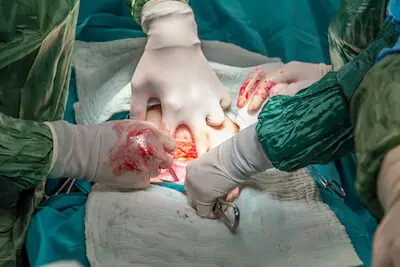I hope I’m not getting on your nerves; pardon the pun, about discussing nerve pain after a c-section so much lately.
I don’t think I am if my inbox is any indication anyway.
First and foremost, I want to assure you that c-sections are very standard procedures these days. While any surgery does bear some risk, as you know, they have been delivering babies via c-section for several years now.
This is always why I advise discussing c-sections with your doctor when you’re pregnant.
Yes, even if you plan on vaginal delivery. Because if you’ve read my story, you know that my first c-section was not planned. You can read the whole thing here. But in short, I had planned to deliver my eldest via vaginal delivery with the help of an epidural.
The day would come that my water would erupt most monumentally and that I’d then spend nearly 24 hours in labor while my eldest decided it would be a good time to turn around in the womb.
I want to point out that she still is prone to turning the wrong way. She and her sister both love to help with the grocery shopping and will take turns pushing the cart. And I can guarantee every time I tell her to turn right; she’ll head left.
Anyway, I had to have that c-section. But I chose to have one for my second daughter.
It is always a bit scary, I think. Add to it being in a foreign country, and it gets scarier.
As I’ve mentioned lately, nerve damage is infrequent after a c-section. Some things get on your nerves regarding pain or discomfort as it heals, but having long-lasting permanent damage is not very common.
Do nerves get cut during C-sections?
Yes, your doctor can’t open you up without cutting into nerves. They are running all through your body, and some major ones are in the vicinity of where that incision needs to go.

And hence, even if you do not want to have a c-section and do not plan for it, you absolutely MUST speak to your doctor about what will happen in the event that you MUST have one.
Has your doctor been doing c-sections for years? How many does your doctor perform every year? In other words, ask these questions now to determine you’ve got the right person in your corner should things take a crazy turn and you wind up in the OR being prepared for c-section surgery.
Even the best doctors can accidentally hit those important nerves, though. So check your doctor’s licensing and medical listings and make sure it all checks out. You want to have all your bases covered here to avoid trouble ahead.
Nerve pain after a c-section is normal, though. And notice I said “pain” and not “damage.” Like other tissues and muscles, your nerves will be cut, and it will take time to regenerate and heal.
As such, you may feel burning, stinging, zapping, or other unusual sensations. Numbness on the skin may also be a factor, but there may be nerve damage if you can’t feel anything.
The thing is that you should make sure to tell your doctor about anything you notice. They will be able to tell you if it is normal or take a closer look. I wouldn’t get freaked out until it’s been a good 6 months post-surgery, and you’re still having those weird sensations. Though keep in mind that some women take longer to heal than others.
A good sign is noticing that things are improving with time. This will show you that your body is restoring itself.
Which nerves could become damaged after my c-section?
I briefly touched upon some of the nerves that may be affected in another recent post so check that out. And since writing it, I found this fascinating article about nerve damage.
The article refers to a 2008 study of cadavers. They looked at the path of certain nerves – the ilioinguinal and iliohypogastric nerves, to be exact, which I wrote about recently. They found by studying these nerves in the dead that surgical incisions that are performed below the level of the anterior superior iliac spines had the biggest risk of damaging those two nerves.
Ok, Leslie, but that’s the dead. How about on the living? Glad you asked!
A study from 2005 reported that incisions on the low transverse fascial portion risked injury to those same nerves.
Nerve injury is important to know about because post-pregnancy, there may be a need to rehabilitate and retrain the abdominal areas, not just for diastasis and stability, but for the ilioinguinal and iliohypogastric nerves as well.
Why?
Because if those nerves are trapped, it can affect the success of your recovery. Another symptom that could be seen when there is nerve damage is the pouching of the area in the front.
Isn’t that fascinating? I thought so too.
Now you’re probably wondering why I told you this. It wasn’t to freak you out or make you worry. It is so you can be armed with information to help you.
How does this help me, Leslie?!?
It helps because you’ll now be thinking of these things as you pick your doctor. You’ll think of them as you ask questions during your pregnancy. Because I’ll tell you this…

Between pregnancy and raising babies and children, ALWAYS have a backup plan. Always. It is great to write down your birthing plan. I’ve said this before. But what if something changes last minute?
This is why you need to have a frank discussion with your doctor about their c-section skills, even if you’re not planning on having one. Because if you don’t think about that backup plan and have to have an emergency c-section, you won’t know what to expect.
Now that you know the questions to ask, what is and isn’t normal regarding abdominal pain during c-section recovery, and the difference between nerve damage and nerve pain, you can better plan.
And let me ease your mind before I tell you this…no matter what happens – even if you are one of the rare cases that have nerve damage, there are ways to take care of it.
So, breathe. Enjoy those last moments before your little one comes into this world, and you have no time for yourself for a while. Everything is going to be great!
Leslie Berry lives with her husband and two young daughters in Los Altos, California, where she loves helping other moms get comfortable with motherhood and embracing the insanity with facts peppered with laughs.
She loves eating too much sushi, exercising, and jamming out on her Fender. Read more about Leslie here.






